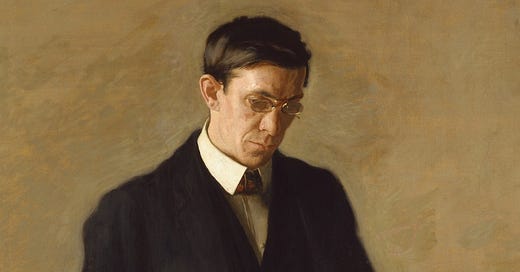Stoner by John Williams
A short novel following the quiet desperation and harrowing experiences of an all too familiar life
“What did you expect?” is a poignant, apt question William Stoner repeatedly asks himself as the story and his life winds to it’s completion.
Described in a sentence Stoner is a magnification of the misery, toil, and quiet desperation of the common, imperfect man. The life of William Stoner represents the stolid, unfulfilled life that countless generations of men have lived out. That’s not to say that the same themes/experiences/existential crises don’t overlap with the female experience, but they seem to me particularly rooted within manhood. I’ll expound upon this by exploring the book itself.
William Stoner is born around the emergence of the 20th century — an era marked by turbulence, perpetual war, and pressing uncertainty. His upbringing makes him relatable and innocent. As an only child raised by illiterate, impoverished farmers who speak few words his entire childhood, he knows very little about love and companionship. What follows from his adolescence makes him very much fit the everyman archetype. He’s an awkward and shy man whose meekness and passivity lead him down irreversible decisions that he is never able to overcome. In search of a mere morsel of passion, meaning, or self-defined direction in his life, he rushes to marry a young woman who clearly does not share his same affection. With persistence, he manages to become married to a woman who reluctantly agrees and spends the rest of his life dealing with the consequences of her resentment towards him.
Meanwhile, through his studies at the university, he redirects his life towards literature, befriends two fellow students and finds a spark of enthusiasm in life. As foreshadowed by what we know of the time period, World War I quickly erases one friendship and forever alters many of his relationships. His mentor, Archer Sloan, slowly degrades into despair before passing away in a bitter fashion that leaves Stoner distraught. This only stabs deeper into the misery of Stoner when he recognizes Sloan’s fate as one he’s likely to encounter himself following WWII.
The turning point for me as far as sympathy for Stoner occurs when he engages in a love affair with a younger colleague. Not only did I find this a pathetic escape for Stoner, but it seemed as if John Williams was trying to express his own fluid ideological position surrounding love and marriage. To me, Stoner carried around this false piety and attempted to justify his affair by expressing his marital frustrations. I personally don’t find infidelity as excusable — even in a tumultuous, unhappy marriage like Stoner’s. Despite Edith’s resistance, an amicable dissolution of their relationship would seem more appropriate, especially when you consider the wellbeing of his daughter. Once you pair Edith’s resentment and Stoner’s affair, the depressing fate of Stoner’s daughter Grace seems inevitable. Her situation and childhood emotionally bothered me more than how sad Stoner was that his affair didn’t have a happy ending (surprise, surprise. who couldn’t suspected that?)
The only thing that tethered Stoner to any sense of meaning or direction in his life was his job. It brought him joy, consistency, and pride in a way that nothing else did. No matter how bad times got, he felt a duty and comfort in his job — which is where I tie things back to the male experience. I imagine we all know a father, brother, grandfather, or friend who despite living a misery-ridden, distressed life, grit their teeth, show no sign of despair and persist. Maybe it’s a father who works 12-16 hour shifts, never sees his family, has no time for hobbies or passions, yet finds purpose in providing for his family. In another time, it’s the young man who hopelessly finds himself on the front lines and accepts his abysmal fate. For better or worse, there is a characteristic of masculinity that accepts, and sometimes invites, misery and despair with an empty smile. “What did you expect?” is what Stoner and many men ask themselves. They exist and persist with no expectations of rainbows or happy endings. They seek for any grain of meaning and hold onto whatever they can contain in their grasp. With that said, this ‘characteristic’ as I describe it as not always healthy or admirable. Stoner himself is full of flaws including how he treats Edith, his neglect of Grace for most of the novel, his infidelity, his reckless ego in his resistance with Hollis Lomax, among other issues. But to me, the masculine and universally human question that underlies this work is this: what are you to expect from a life that has no inherent meaning and grants you no promises? And are you to give in or dogged persist?
To wrap up a long review, the novel digs into a variety of other concerns as well such as friendship, institutions, the human condition more broadly, and others. It’s a reflection of the ruthless nature of life, a snapshot into a life fairly under-lived with a multitude of regrets, and leaves you wondering what it means to live a good life. It’s a book I’ll likely not re-read and rarely revisit, but one that I’m glad I did read.
To following along with what I’ve actively reading and to view more reviews, you can find my Goodreads or subscribe to my Substack




